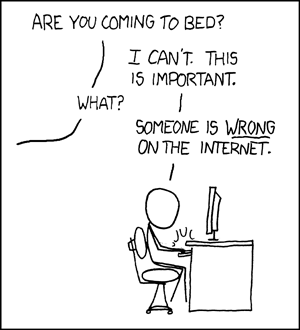“A person with conviction is a tough man to vary. Inform him you disagree and he turns away. Present him your details or figures and he questions your sources. Enchantment to logic and details and he fails to see your level.”
Leon Festinger
Dorothy Martin was a charismatic chief with a singular ability. She may channel communications with extra-terrestial beings. Again in 1954, she headed a bunch of believers who had been satisfied that the ultimate cataclysm of earth was going to occur and that their small, dedicated band can be those to be saved.
It’s an not unfamiliar story. A bunch of adults, some school educated, left their jobs, locations at college and their households to affix this group. They had been ardently satisfied that on December twenty first, 1954, that they’d be transported to security on a flying saucer.
Now, it doesn’t take a leap of logic to know the way this ends. While a crowd of reporters, onlookers and researchers noticed the approaching ‘arrival’, the group ready of their home for the midnight arrival. There was no arrival. The group had been devastated, with Martin left tearful.
Cognitive dissonance and backfiring feelings
In fact, Martin miraculously managed to channel additional communication from the planet ‘Clarion’ (in what should certainly be termed a ‘clarion name’) that the God of Earth has known as off the top of days. Every true believer was confronted with cognitive dissonance. That’s to say, we now have a potent drive to carry onto our deeply held beliefs and we’ll reject any proof on the contrary that destabilises us mentally and/or emotionally.
That is exemplified by the unhappy occasion from 1954. As an alternative of rejecting Martin and her failed prophecies, the group rapidly tailored and located a story that might see them proceed their beliefs. They acquired one other message; they thought of that the assembled crowd scared off the spaceman, who doubtless stood amongst them. Briefly, they reaffirmed their beliefs much more strongly, regardless of proof on the contrary.
Leon Festinger, a researcher who noticed Dorothy Martin and her band, used this story to determine his concept about cognitive dissonance and the way, when confronted with proof, we don’t essentially shift our deeply held beliefs in his article: ‘When Prophecy Fails: A Social and Psychological Examine of a Trendy Group That Predicted the Destruction of the World’. Festinger theorised that 5 key situations have to be current if somebody is to change into a extra fervent believer even after proof disconfirms these beliefs:
- A perception have to be held with deep conviction and it should have some relevance to motion, that’s, to what the believer does or behaves;
- The particular person holding the assumption should have dedicated himself to it; that’s, for the sake of his perception, he should have taken some vital motion that’s troublesome to undo. Usually, the extra vital such actions are, and the harder they’re to undo, the higher is the person’s dedication to the assumption;
- The assumption have to be sufficiently particular & sufficiently involved with the true world in order that occasions could unequivocally refute the assumption;
- Such plain disconfirmatory proof should happen and have to be acknowledged by the person holding the assumption;
- The person believer should have social assist. It’s unlikely that one remoted believer may stand up to the type of disconfirming proof that has been specified. If, nevertheless, the believer is a member of a bunch of satisfied individuals who can assist each other, the assumption could also be maintained and the believers could try to influence nonmembers that the assumption is appropriate.
You might contemplate Festinger’s work as deeply miserable. You’re doubtless contemplating the numerous examples in your life, in politics and extra, the place alien landings are represented by one thing a little bit extra ‘regular’.
Notice among the patterns with what you see within the media and even the way you and I act in our chosen media: we band along with individuals who share beliefs like us; we scrutinise some proof way more than others (we problem the proof that jars with our beliefs in fact – it’s labelled ‘selective scepticism’); we spurn ‘consultants’ ; we share our opinions and enter echo chambers of comparable voices; we scorn bias in others, however then fail to recognise that we’re performing in the identical blinkered method ourselves.
Although a little bit miserable, figuring out that individuals who have their beliefs challenged with proof and details don’t change their beliefs; as an alternative, they affirm them much more strongly, is highly effective data (it has been helpfully termed the ‘Backfire Impact’). It’s highly effective as a result of step one in decreasing our biases is recognising that we possess them as different do. It saves us time. That subsequent on-line argument you leap into for a minute or two, however lasts an hour, might be time saved, with the data that you’ll seldom change folks’s minds or their beliefs. You’ll doubtless get extra accomplished.
Supply: https://xkcd.com/1802/
No easy solutions, no silver bullet proof
Secure with all of this information chances are you’ll assume that the Dorothy Martin’s of the world get their comeuppance. Their falsehoods are uncovered and they’re discredited. Effectively, Martin went onto provoke a brand new order below an alias of Sister Thedra till her loss of life in 1992. Apparently, her new order is constant to at the present time.
I provide no easy options. I do assume that the following time you leap right into a debate on-line, otherwise you dare to dive ‘under the road’ on a controversial web subject, contemplate this video and assume what proof are we lacking, or refusing to countenance:
And for a remaining phrase:
“True ignorance just isn’t the absence of information, however the refusal to amass it.”
Karl Popper

